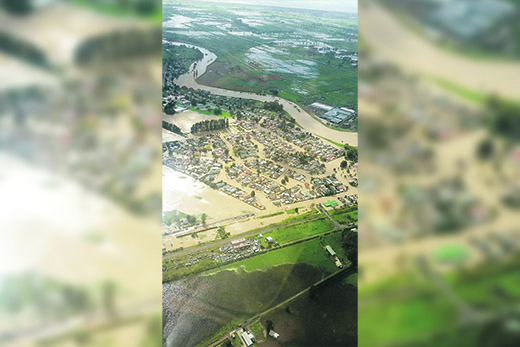Dairy farmers in the Edgecumbe region can be proud that their effluent ponds stood resilient above the April floods, says Steve Bailey from Bay of Plenty Federated Farmers. “A flyover of the Edgecumbe floods showed that dairy farmers can be proud of how their effluent withstood the floodwaters, while the same could not be said for the municipal sewerage facilities.” This is just another example of the steps farmers take to minimise environmental impacts, but their actions are all too often overlooked by mainstream media and the public, Steve says. “Despite difficult weather and a tough wet spring, Bay of Plenty Regional Council’s pollution officers have reported that compliance this season has shown an improvement on the previous season. However, media are still reporting negative news about dairy farming despite a lot of good results being achieved.” Steve says dairy farmers generally are frustrated with the mainstream media’s persistent attack on their integrity as farmers and their family businesses. “The targeted journalism this season has been adding fuel to those seeking to condemn the dairy industry. How damaging is the push of a button, the snap of a photo, the one-dimensional view of posts on social media, and the heightened emotional culture? “The news is being presented out of context, with the presenters giving their own opinion on the news items. There is a balance in taking a lead role and being proactive in mitigating the issues when the issue always has moving goalposts. “Every bit of new technology that we install on our farm costs money and needs to be paid for out of the milk being produced. We need to ensure the information received from this new technology warrants the cost. No apologies needed “As a result of social media, farmers are feeling less open to inviting visitors onto their farm and being open about their business. They are never quite sure what strangers’ agendas might be. We must not, as an industry, feel the need to apologise for working outside in the elements. We should not apologise for milking the cows to provide milk and cheese to our customers and providing meat for the dinner table. It does rain and it does get hot and animals do not stop being animals at 5pm, they do need food and water 24/7.” Steve says the Bay of Plenty region’s quarterly dairy stakeholders’ meetings continue to be an important forum for frank discussions about dairying issues with council staff and also key dairy industry stakeholders. This includes Rotorua farmers who are in the BOPRC catchment. “This year, discussions have included coping with the difficult weather and financial climate, land use and the continued Plan Change 9 (about water quantity) conversation. The Federated Farmers team on this committee has very clearly portrayed the dairy farmers’ view and the need for farmers to have adequate water for cowshed use. Lot of emotion “There is still a lack of real clarity for many farmers about what is actually required. There is a very lengthy process and the detail required can be somewhat over-complicated. There is a lot of emotion and sense of urgency in the water issue. While we understand information is lacking, Federated Farmers has taken the stance of holding the line until the information and research has been gathered. Decisions shouldn’t be made before there is adequate data.” Steve says the autumn of 2017 will long be remembered for the floods. With more than 1000 hectares flooded and many dairy farms under water, for many, their farms have changed shape. “While a catastrophic situation, the rallying together of the rural community has been tremendous. There are many individuals that stood up and put others ahead of themselves. In the worst of times, we often see the best in people. Huge thanks to all involved in the recovery, there is still some way to go.” Adverse climatic conditions are not all farmers face and with spring just around the corner farmers need to review their calf handling and bobby calf facilities and systems. New regulations The new regulations capture transporting, loading, unloading, adequate shelter (especially for bobby calves awaiting transportation), age of stock, euthanising and timing of feed before slaughter. Federated Farmers do have a fact sheet on the requirements and DairyNZ also has a lot of resources. “The responsibility for the welfare of the animals is with all those in the supply chain. There is a sense of frustration by many about having to do this but the fact of matter is that MPI has reviewed the regulations alongside a committee of stakeholders. Federated Farmers have pushed hard to get to where we are now. “Agriculture has evolved and will continue to evolve, and there will always be challenges along the way. I liken issues to a pothole in the road – we can either drive around it or fix it so we can continue the journey, navigating the road ahead. We need to keep the road behind in good shape for now and years to come and ensure that the pathway laid encourages succession.”
Thursday, April 25, 2024
Posted: 1:59pm Monday 17 Jul, 2017
Attacks on integrity frustrating



0 Comments
Leave a Comment